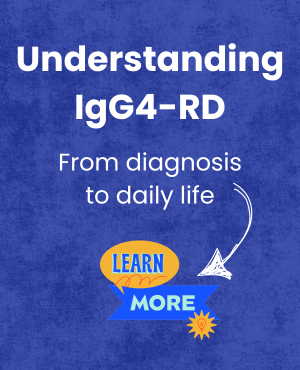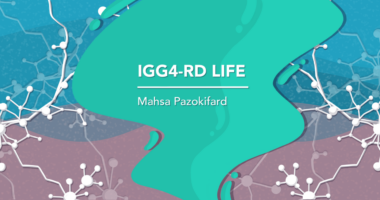
Glucocorticoids for IgG4-related disease
Last updated May 29, 2025, by Marisa Wexler, MS

What are glucocorticoids?
Glucocorticoids are a cornerstone treatment for immunoglobulin G4-related disease (IgG4-RD). These powerful anti-inflammatory and immunosuppressive medications are a type of corticosteroid, a class of steroid hormones. They work by mimicking cortisol, a steroid hormone naturally made by the body that regulates the body’s stress responses, metabolism, and immune system.
In IgG4-RD, immune cells called B-cells form abnormal clumps in the body’s tissues, causing inflammation and tissue scarring that ultimately drives IgG4-RD symptoms. By reducing the abnormal activity of these cells, glucocorticoids can help alleviate symptoms and tissue and organ damage in people with IgG4-RD.
However, these medications are associated with serious side effects when used over a long period or at high doses. As such, glucocorticoids may not be recommended for all patients, and are typically reduced gradually, ideally until patients are free from these medications without experiencing disease relapses.
When are glucocorticoids used for IgG4-RD?
Glucocorticoids are generally recommended as the first-line treatment for people who have active IgG4-RD that is causing symptoms, unless the individual has other health conditions that make them unsuited for such medications. Those without symptoms, but with involvement of vital organs, are also recommended to start glucocorticoid treatment.
IgG4-RD treatment mainly seeks to induce and sustain disease remission, where all signs of disease activity are completely suppressed, to prevent relapses and irreversible organ damage. Studies suggest that glucocorticoids are effective for inducing remission in up to 95% of people with IgG4-RD.
Glucocorticoids are usually taken orally, but may be infused directly into the bloodstream in more severe cases. A common regimen used to induce IgG4-RD remission involves the oral glucocorticoid prednisone, given at a dose of 30 to 40 mg per day, though dosages vary widely depending on each patient’s specific condition.
The initial glucocorticoid dosage will usually be continued for about a month to control the disease, after which it will be slowly decreased over a few months until glucocorticoids can be stopped entirely. This slow dose reduction, known as a taper, is needed because suddenly discontinuing high-dose glucocorticoids can lead to dangerous withdrawal problems.
Although glucocorticoids are generally good at inducing IgG4-RD remission, patients will frequently experience relapse, or periods of sudden disease activity worsening, during glucocorticoid tapering or after their discontinuation. In such cases, additional rounds of glucocorticoids and/or introduction of other immunosuppressive medicines may be used to induce remission again.
Maintenance treatment with low-dose glucocorticoids may also be considered for those at increased risk of relapse. However, long-term glucocorticoid treatment is associated with a higher risk of problematic side effects.
Glucocorticoid side effects
Despite being highly effective in IgG4-RD, glucocorticoids can cause serious side effects and complications, particularly when used at high doses over prolonged periods of time. Common side effects of glucocorticoids may include:
- unexpected weight gain, particularly noticeable in the belly, face, and the back of the neck
- increased appetite
- mood changes like anxiety or restlessness
- excessive hair growth
- skin changes like acne, bruising, and skin thinning
- trouble sleeping
- swelling in the lower legs
- muscle weakness
- fatigue
- upset stomach.
Glucocorticoid treatment can also increase the risk of other health problems, including:
- infections
- diabetes
- high blood pressure
- reduced bone density (osteoporosis), which can increase the risk of broken bones and fractures
- eye-related problems such as cataracts and glaucoma.
The specific risks associated with glucocorticoid use will depend on the particular medication, its dosage, and how long the treatment is given, as well as the person’s underlying health conditions. Patients are advised to talk to their doctors about the specific risks and benefits of glucocorticoid use in their individual situation.
IgG4-RD News is strictly a news and information website about the disease. It does not provide medical advice, diagnosis, or treatment. This content is not intended to be a substitute for professional medical advice, diagnosis, or treatment. Always seek the advice of your physician or other qualified health provider with any questions you may have regarding a medical condition. Never disregard professional medical advice or delay in seeking it because of something you have read on this website.
Recent Posts
- Neurological symptoms may be more common in IgG4-related disease
- Guest Voice: Living with IgG4-RD is the new hobby I didn’t want
- In the language of illness, words can heal, or they can hurt
- IgG4-RD patients with allergy history are more likely to relapse: Study
- Eye muscle involvement may raise relapse risk in IgG4-related eye disease



